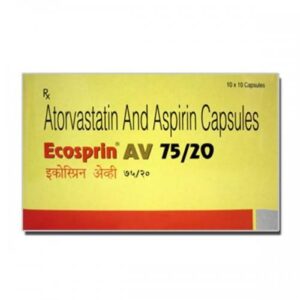ATORVASTATIN + ASPIRIN
Atorvastatin: Atorvastatin is a prescription medication that belongs to a class of drugs known as statins. It is primarily used to lower cholesterol levels and reduce the risk of heart disease.
The mechanism of action of atorvastatin involves inhibiting an enzyme called HMG-CoA reductase. This enzyme plays a crucial role in the production of cholesterol in the liver. By inhibiting this enzyme, atorvastatin helps to decrease the amount of cholesterol produced, leading to a decrease in total cholesterol and low-density lipoprotein (LDL) cholesterol in the blood.
The recommended dose of atorvastatin varies depending on the patient’s condition and response to treatment. Generally, the initial dose ranges from 10 mg to 20 mg once daily. The dosage can be adjusted by a healthcare professional if necessary. It is important to follow the prescribed dose and take the medication consistently.
Like any medication, atorvastatin can cause side effects. Common side effects include headache, muscle pain, diarrhea, and nausea. In rare cases, it may also lead to liver problems or an increase in blood sugar levels. It is important for patients to report any unusual or severe side effects to their healthcare provider.
It is worth noting that atorvastatin may interact with other medications. For example, it can interact with certain antibiotics, antifungal drugs, and certain heart medications. It is important to consult a healthcare professional or pharmacist about potential drug interactions before starting atorvastatin.
Overall, atorvastatin is an effective medication for managing high cholesterol levels and reducing the risk of heart disease. However, it is essential to use this medication under the guidance of a healthcare professional, monitor for side effects, and make necessary lifestyle changes to maintain a healthy cholesterol profile.
Aspirin: Aspirin, also known as acetylsalicylic acid, is a commonly used medication that belongs to the category of nonsteroidal anti-inflammatory drugs (NSAIDs). It is primarily used for its analgesic (pain-relieving), antipyretic (fever-reducing), and anti-inflammatory properties.
Mechanism of Action: Aspirin works by inhibiting the production of certain chemicals in the body, specifically prostaglandins. Prostaglandins play a role in pain, inflammation, and fever. By blocking the enzymes involved in their synthesis, aspirin reduces the production of prostaglandins, thereby reducing pain, inflammation, and fever.
Use: Aspirin is used to relieve mild to moderate pain, such as headaches, toothaches, menstrual cramps, and muscle aches. It is also commonly used to reduce fever and as an anti-inflammatory drug for conditions like arthritis. Additionally, aspirin is sometimes prescribed to reduce the risk of heart attacks, strokes, and blood clot formation in individuals at high risk or who have already experienced such events.
Dose: The dose of aspirin varies depending on the condition being treated. For pain relief or fever reduction, the general recommended dose in adults is 325-650 mg every 4 to 6 hours, not exceeding 4 g (4000 mg) within 24 hours. For its cardiovascular protective effects, lower doses (81-325 mg) are typically used daily, as directed by a healthcare professional. It is important to follow the recommended dosage and consult a healthcare provider if unsure.
Side Effects: While generally safe when used as directed, aspirin may cause certain side effects. Common side effects include stomach upset, heartburn, nausea, and allergic reactions like rash and itching. Aspirin can also increase the risk of bleeding, especially in higher doses or when combined with certain medications. Prolonged use of aspirin at high doses can irritate the stomach lining and increase the risk of peptic ulcers. Rarely, aspirin may cause more serious side effects such as ringing in the ears (tinnitus), stomach bleeding, liver or kidney problems, or severe allergic reactions. It is important to seek medical attention if any unusual or severe side effects occur.
It is worth noting that aspirin should not be used in children and teenagers recovering from viral infections (such as flu or chickenpox) due to the risk of Reye’s syndrome, a rare but serious condition. In such cases, alternative medications should be considered.
As with any medication, it is essential to follow the instructions provided by healthcare professionals and read the product label carefully for proper use, dosage, and potential interactions or precautions.


